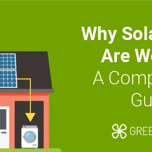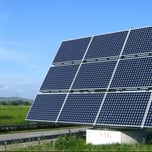Answer these simple questions and we will find you the BEST prices
Which type of solar quotes do you need?
It only takes 30 seconds
100% free with no obligation

Get up to 4 quotes by filling in only 1 quick form

Slash your energy bills by installing solar panels

For the average 2-3 bedroom house
- GreenMatch
- Blog
- How to Choose a Solar Panel
How To: Choose a Solar Panel | October 2025 Guide
Ok, so you decided to install solar panels at home and produce your own (and clean!) electricity but are unsure how to choose the right solar panels for you? Then keep on reading!
However, if you already have a good idea of which solar panels you'd like for your home and just want to talk to a professional installer, then we can help connect you now.
At GreenMatch, we have an extensive network of qualified solar panel installers across the UK. We can put you in touch with up to 3 reliable installers in your area. You'll also receive quotes from each installer, so you can easily compare their prices and choose the one who offers the best value.
Click the button below to get your free no-obligation quotes and have your solar panels installed in no time.
- Quotes from local engineers
- Payment by finance available
- Save up to £1,567 per year
It only takes 30 seconds



Find out How You Choose Your New Solar Panel
We've created the list below to serve as a guide to making a good purchase. You should always keep in mind that a solar panel system is a long-term investment, hence there are many aspects other than the price that you should take into account.
1. Solar Panel Cost
This is probably the first factor people consider when comparing solar panels. The solar panel cost is determined by different variables: the size (in Watts), the physical size, the brand, the quality of the materials, the durability (or warranty period) and any certifications the solar panel might have.
A key guide on how to choose a solar panel is to consider the cost. However, it shouldn’t be the one and only factor to be considered, since the least expensive panel might not be the most efficient and probably not the best option if you consider the long term. How to choose solar panels can be risky but, they have a long lifespan (more than 30 years), so it is more important to ensure a good quality system than choosing the cheapest option.
2. Solar Panel Quality
This takes into account how the panel is manufactured and the quality of the materials used to build the solar panel. There are different types of manufacturers producing panels that differ in quality, price, and efficiency. There are vertically integrated solar panel manufacturers which control each stage of the production process. They put a strong eye on quality and invest a lot into research and development (R&D). There are other manufacturers that only assemble panels, but usually don't manufacture their own cells and don’t invest in R&D. They use more human production than robotic, but produce the most affordable panels.
When choosing your solar panel supplier it is wise to check the companies’ reviews or history and see what experiences clients had with each of them. Since you will make a big investment, it is important to do a bit of research and see if clients are satisfied with the product and the customer service, and if the company did all that it has promised.
3. Energy Efficiency
Solar panel efficiency is how much of the light the panel receives is converted into electrical energy and hence, how much power your system will generate. The more efficient, the better (and more expensive). It is not always the best choice to get the biggest and highest efficiency solar panel, since you might end up spending more money than you should to cover your energy needs.
You should assess your requirements and find the panel that best suits your needs: this means not underestimate, but also not to overestimate your needs. Likewise, you don’t need a Ferrari to take your children to school (you can have it of course, but you can do the same spending a lot less).
4. Temperature Coefficient
This refers to the impact that heat has on a solar panel’s operational efficiency after installation. Since solar panel overheating accelerates their ageing, the lower the percentage per degree Celsius, the better.
5. Durability
This could be an indicator of the manufacturer’s confidence in its products. Usually, solar panels have a 25 year warranty (as long as the company operates). If the manufacturer does not offer a long warranty period, you could suspect that their product is not very good and hence they don’t want to take any responsibility. In this case, be careful not to be mislead by a tempting price since you might regret it in the long term.
Of course, it is important to properly maintain your solar panels to increase the lifespan of them. Fortunately, they are easy to take care of and don't require much maintenance.
6. Size
This takes into account the physical size and the size in Watts. You should make sure to install a solar panel system that is big enough to power all your appliances, and also that you have the space required to install it. The physical size of the panel will vary depending on how powerful the system is (the more Watts, the bigger) and the type of solar cells used to build the panel.
An average household would typically require a 4kW solar system. Watts are related to the output of the panel (a 200 Watt panel will generate 200 Watt-hours each hour under ideal conditions while a 100 Watt panel will generate 100 Watt hours) and they are directly related to the price of the system.
The wattage of the solar panel is probably the most important thing you need to get right since underestimating the number will lead to a lack of energy, and overestimating the wattage will lead to spending more money than you actually need.
7. Types of Solar Cells Used
There are different types of solar panels with different efficiencies. Although their names might sound confusing, it is good to know at least the name not to be out-of-topic if your supplier happens to mention this.
Monocrystalline silicon offers high efficiency and good heat tolerance characteristics with a small footprint. Polycrystalline (or multi-crystalline) silicon cell based solar panels are now the most popular choice in residential installs. There are also Amorphous (or thin-film) silicon cells, which use the least amount of silicon and are not very efficient. For an equivalent wattage, a crystalline panel will be smaller than an amorphous panel.
Find the Right Solar Panel System for Your Home
Now you have the tools to choose the solar panel system that best suits your needs and be immersed in the world of solar energy. You should always compare different offers and see which supplier you find more convincing.
To help you with this task, our team at GreenMatch can provide you with up to 3 quotes for free. You will be contacted by different suppliers with their offers and you can then proceed to choose the one you prefer (there’s no obligation to choose any).
- Quotes from local engineers
- Payment by finance available
- Save up to £1,567 per year
It only takes 30 seconds



We strive to connect our customers with the right product and supplier. Would you like to be part of GreenMatch?





